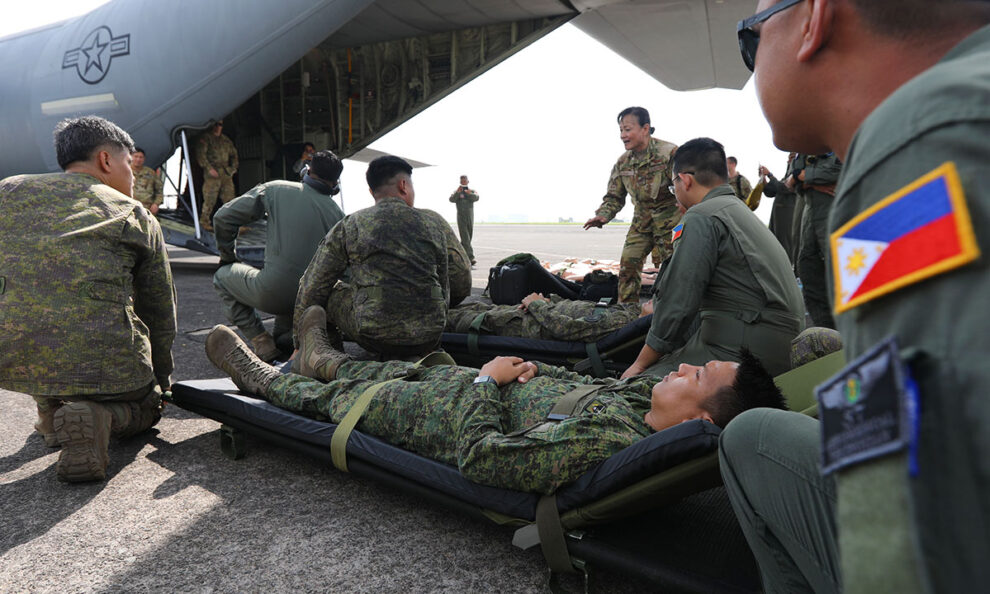THE PHILIPPINES is in talks with another country for a visiting forces agreement (VFA), the Foreign Affairs department said on Wednesday, as the Southeast Asian nation boosts security ties amid rising tensions with China.
“We are in discussions now [with] a major partner near China,” Foreign Affairs Secretary Enrique A. Manalo told a House of Representatives budget hearing, without naming the country.
“We have the VFA with the United States and Australia. We are not closed to similar arrangements with friendly partners who wish to do so,” he added.
The country’s top envoy said the partnership would cover not only defense and security but also the economy.
The Philippines under President Ferdinand R. Marcos, Jr. has pursued closer ties with the US and its allies amid China’s increasing assertiveness in the South China Sea.
On Aug. 5, the Chinese Coast Guard, backed by its maritime militia and People’s Liberation Army (PLA) ships, fired water cannons to drive away Philippine vessels trying to deliver food and other supplies to a grounded ship at Second Thomas Shoal.
The shoal is about 200 kilometers from the Philippine island of Palawan and more than 1,000 kilometers from China’s nearest major landmass, Hainan Island.
China’s move prompted a diplomatic protest from the Philippines and statements of concern from countries including the US, Japan, Australia, South Korea and members of the European Union.
Mr. Manalo said the Philippines seeks to address its sea dispute with China “by trying to forge more links.”
The Philippines’ visiting forces agreement with the US, a treaty ally and former colonizer, lays down the rules for American soldiers participating in war games in the Philippines.
In February, Philippine President Ferdinand R. Marcos, Jr. said Manila was eyeing a similar pact with Japan. “There was already a proposal for certain areas,” he told Japanese news wire Nikkei during his official visit to Tokyo.
“I think it really is just a progression of what has already been happening, so we are just intensifying our joint exercises.”
In June, the top security advisers of the Philippines, US and Japan held their first-ever talks in Tokyo, discussing regional security issues, including those involving the South China Sea, and ways to boost their three-way cooperation. Their coast guards held joint exercises that month.
Mr. Marcos on Wednesday recognized Japan’s role in maintaining peace and security in the South China Sea, saying the bilateral and multilateral deals between Manila and Tokyo have helped keep the region stable.
“I refer to the tripartite trilateral agreements that we have been talking about and have started to implement in terms of joint patrols, in terms of joint exercises for the two maritime forces of Japan and the Philippines,” he said during a courtesy call from Komeito Party Chief Representative Yamaguchi Natsuo at the presidential palace in Manila.
He cited Japan’s contributions in terms of equipment and training, as well as how it has helped preserve the peace and free conduct of trade and shipping in the South China Sea.
In their meeting, the Philippine leader also expressed concern over tensions in the Korean Peninsula, which flared after North Korea fired an intercontinental ballistic missile.
Mr. Marcos expressed support for the plans of Japanese Prime Minister Fumio Kishida, who is set to hold various discussions on regional peace.
“We consider it a critical issue that, really, we in the region must work together very, very hard to try to alleviate the tensions, to try to make all the proponents of peace in the region be the dominant voice,” he said.
Japan is the Philippines’ top infrastructural donor and supporter.
The Philippines got P109 billion in official development assistance (ODA) from Japan from April 2021 to March 2022, the biggest among Southeast Asian beneficiaries, the Japan International Cooperation Agency said in January.
Japan is raising its defense spending to 2% of its gross domestic product by 2027 or by 60% over five years, hitting the third spot on the list of countries with the largest defense budgets. Tokyo has been citing China’s aggression and North Korea’s unpredictability.
Experts earlier said it would be beneficial for the Philippines to tap Japan’s growing desire to be a more noticeable security provider in the region, noting that Tokyo’s Foreign Affairs Ministry has allotted significant resources to improve the defense capabilities of friendly neighbors.
Lucio B. Pitlo III, a research fellow at the Asia-Pacific Pathways to Progress Foundation, earlier said growing ties among the Philippines, Japan and the US could have been prompted by the failure of the Association of Southeast Asian Nations (ASEAN) to tackle regional security issues.
At Wednesday’s House hearing, Mr. Manalo said the Philippine government is open to holding joint patrols with its Southeast Asian neighbors.
“If there are proposals by other ASEAN countries, we will be very open to consider it, but for the moment we are not aware of any ASEAN-wide joint patrols,” he said.
Albay Rep. Edcel C. Lagman proposed for the Philippines to host an international meeting in support of a 2016 arbitral ruling that voided China’s expansive claims in the South China Sea.
“We cannot sing Hallelujah if we cannot enforce the award,” he told the hearing. “Is the Department of Foreign Affairs considering hosting an international meeting of all kindred countries to solidify their support? It’s an interesting idea we will be happy to explore.”
Meanwhile, Palawan Rep. Edward Hagedorn has filed a resolution urging the Philippine government to conduct joint multilateral maritime patrols to protect its South China Sea claims.
Holding joint multilateral maritime patrols with like-minded nations “will be seen as a stronger and more resolute initiative” in asserting Philippines sovereignty and deterring any aggression at sea, he said in a statement.
“This would also enhance regional and international cooperation which would lead to a more collective response toward security challenges and transnational crimes, such as illegal fishing and piracy,” he added.
Source : Business World










